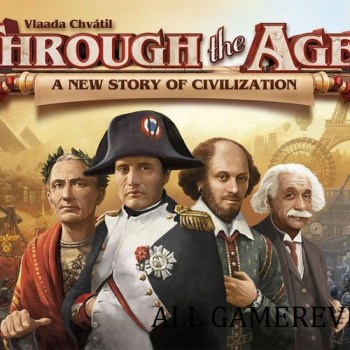It’s a game for 2 to 4 players, the playing time is long, and it’s a pretty complex game. It’s the dawn of civilization, and you are in charge of guiding your people through to the modern era. To do this, you will need to develop infrastructure and keep your people happy and safe from aggression.
But most importantly, you must fund the arts and develop the greatest culture of all. The game ends the turn after the civic cards run out. The winner is the player with the most cultural points after the final scoring events are resolved. Drafting: You will select new civics cards from the main display.
Engine building You will want cards that work well together. Play a turn There are 3 tracks you will adjust throughout the game; the first is your military score, the second your science points, and the third your culture. Whenever you change a score, adjust it here. Cubes drive this game, so let’s look at them. Red cubes are your civic actions; white cubes are your military.
Through The Ages Game

When you improve your government, you can get more cubes, technologies, and wonders. Each action in the game costs cubes. Unless noted, these actions use white cubes. Drafting new cards costs 1-3 actions each. Do not replace cards taken until the end of your turn. Then discard some based on player count and slide them left. If one card deck runs out, use the next one. The yellow cubes are your population.
When you grow your workforce, you move a cube from the bottom row to your worker pool. You will also need buildings that generate happy faces, or workers will get grumpy and unable to work. The blue cubes represent resources. Here we have 2 types of farms and mines. With a total of 6 workers on them, when you produce resources at the end of your turn, place a blue cube for each worker.
Growing your workforce uses food, and building or upgrading buildings uses metal. Let’s upgrade a worker from bronze to iron. Bronze costs two and iron five, so we need to spend three metals. A blue cube on bronze is worth 1, and on iron, it’s 2. So we remove 3 resources’ worth of blue cubes.
The science we generate is equal to the light bulbs on a card. Here we have one worker, so it’s one science. Playing a new card costs the science shown in the top left, and buildings do nothing until they have workers on them. There are also yellow cards that can make actions more affordable.
Here we have 1 warrior, for a military score of 1. We research knights and spend a redaction to place a worker there, for two more. We can also spend a redaction to add an army bonus card. At the start of the turn, you can seed a card into the event deck.
Some of these impact players based on military strength, provide territories to colonize, or impact all players. Instead of seeding a card, you can play aggression or war using redactions. If you are targeted by aggression, you can boost your military with cards. These cards are also used for colonization.
Some Of These Impact Players Based



And if you have too many blue cubes on your board before production, you might lose some to corruption, so try to avoid that. Why would you like this game? Through the ages are low-luck, high-skill civilization games where long-term planning and skillful use of your limited actions and resources are the keys to winning.
There is something quite satisfying about developing your civilization and seeing it grow over time, adding in new buildings, tech, and wonders. Each decision has consequences. One dramatic one is that you can only have 1 leader per age group, so making the right choice is huge.
And there are a lot of different paths to victory and cards to choose from. Another important decision point to consider is In conclusion, a game for the serious gamer who wants to commit the time to a long and quite cutthroat civilization game. The best thing about this game is its app.
It handles all the busy work that dramatically slows down the game in person However, all that cube shuffling is time-consuming, and the game can drag as people fiddle with cubes. And you can also end up in a doom spiral, where if you are behind, it is hard to come back and win, especially as many events and actions punish the weakest player. And finally, it’s a story of western civilization and is presented strongly through that lens.
